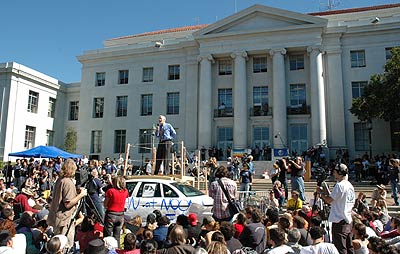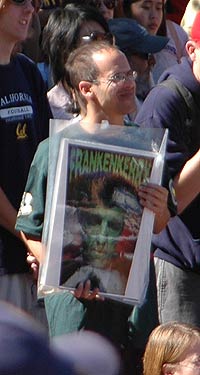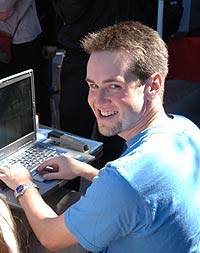UC Berkeley Web Feature
 |
Berkeley Chancellor Robert Birgeneau stands on a borrowed police car to address the crowd assembled to commemorate the 40th anniversary of the Free Speech Movement. (Steve McConnell photo) |
"Give up cynicism": FSM@40 speakers call on today's students to change their world
 View
slide show: Highlights of the rally | Full
webcast View
slide show: Highlights of the rally | Full
webcast |
BERKELEY – They are 40 years older, with knees that couldn't have climbed on top of the police car without the wooden ramp thoughtfully placed there. Their hair is now graying, or long gone, and they have forsworn the dressy uniforms they once wore daily to Berkeley classes. But one thing hasn't changed since Oct. 1, 1964: Jackie Goldberg, Bettina Aptheker, and other Free Speech Movement veterans are every bit as passionate about the need for current Berkeley students to embrace political activism as they once were about fighting for their own right to exercise free speech on campus.
"Cynicism is the most important method of social control in America today," Goldberg, now a California assembly member, told the 3,000-plus people gathered at Sproul Plaza at noon on Friday (Oct. 8) to commemorate the 40th anniversary of the Free Speech Movement at Berkeley. "Because what it does, it tries to make sure that very old, affluent, very rich, very white men still run everything . You have to give up cynicism and realize your own power."
 'Ordinary people can make an enormous difference. The only thing that holds you back is if you believe you can't.' -Howard Dean Governor of Vermont |
Goldberg and Aptheker were joined by Vermont Governor (and former Democratic presidential candidate) Howard Dean, Berkeley Chancellor Robert J. Birgeneau, student leaders and ACLU representatives for a two-hour event that was as much an anti-Bush rally as it was a tribute to the series of sit-ins, protests, and strikes that embroiled Berkeley from October to December 1964.
Berkeley's Free Speech Movement — the heir to the civil rights movement and the progenitor of the Vietnam War peace movement — ultimately liberated students around the nation to act as full U.S. citizens on their campuses, free to hand out literature, whether for the Barry Goldwater campaign or the civil rights movement. It also launched a national debate about whether big universities were simply factories grinding the "raw material" of students into drones ready to take their predetermined place in society, as Mario Savio, the philosophy student who emerged as the Free Speech Movement's passionate (and accidental) leader saw it.
The highlight of a weeklong slate of panel discussions and lectures, the FSM@40 rally began with Terry Garthwaite asking those standing around the police car borrowed for the occasion to sit down, just as thousands spontaneously had when police attempted to arrest graduate student Jack Weinberg for violating the administration's ban on political advocacy. Garthwaite sang freedom songs to 2004's assembled crowd, but despite her exhortations to sing along, most of the assembled students seemed too self-conscious to lend their voices either to Woody Guthrie's "This Land is Your Land" or more informal, ad-libbed ones. The students sitting in Sproul Plaza today had it easy, Garthwaite noted. They didn't have fraternity members walking around the fringes flicking lit cigarettes at their backs.
And this time, they also had a platform on top of the car to stand on. ASUC president Misha Leybovich held up his sneakers as he told the crowd how the 1964 students had respectfully removed their shoes before climbing on top of the car. (Despite their care, the hood of the car was damaged - "and we paid for that damage," Goldberg asserted later.) Leybovich admitted that he had known little about the Free Speech Movement until the untimely death of history professor and FSM veteran Reginald Zelnik, and marveled that at 21 years old he was older "than half the cats" who had been involved back then. He said he felt shame when reading about how cowardly the student government of the day had been, and pride that today's ASUC actively battles injustice on behalf of students.
"It's a fallacy that we are no longer interested," he shouted as students whistled and cheered. "It's a fallacy that we are no longer passionate. It's a fallacy that we are no longer active."
 Like the Free Speech Movement student activists themselves, the assembled crowd was a mix of left, right and center. They wore Howard Dean shirts, waved Bush/Cheney signs, and hawked political merchandise like the long-nosed "Bushocchio" puppet and this "Frankenkerry" poster. (BAP photo) |
Chancellor Birgeneau began by recalling how back in 1964, he had been a graduate student studying physics at Yale, doing volunteer work in the inner city in New Haven. Politically, he was a na´ve Canadian, he said, until he spent the next two summers working on voter registration in the American South with members of the Berkeley Free Speech Movement who quickly turned him into an expert activist. The chancellor said that last week he had had dinner with Henry Kissinger (Nixon's former Secretary of State, whose name inspired boos and hisses from the crowd) and a senior government official from Vietnam he declined to name, but who told Birgeneau that "we would not have peace and unity in Vietnam if it were not for the antiwar movement in the United States."
Interrupting the cheering crowd, Birgeneau said he wanted to say something they might not want to hear - but that that would be the point. He quoted a campus public-policy professor as asserting that speech is less free on the campus than it used to be, because of certain politically correct notions. "We have to be vigilant from both the left and the right," Birgeneau said. "We have to be willing to allow people to hold opinions that are highly controversial," and never suppress free speech simply because we don't agree with it.
Few in the crowd seemed to disagree with what Assemblywoman Goldberg had to say. In 1964, Goldberg was a senior and a sorority girl picked to be a spokesperson for the uneasy coalition of student political groups negotiating with the campus administration. "When I came to Berkeley the most important advice my parents gave me was don't sign anything," she told Friday's crowd, explaining that back then, it was not unusual for the FBI to be keeping tabs on students and for employers to refuse to hire politically active ones. In fact, after she became a high school teacher, even a teacher shortage in Los Angeles couldn't persuade its school board to overlook her arrest record, so she ended up teaching in Compton, Cal. - until she was elected to the L.A. school board and managed to change the law.
Goldberg played to the crowd of mostly students by telling them what she had paid for tuition in 1964: "Nothing! Not a dollar! And if every student in this state 18 years and older was registered to vote, you wouldn't be paying any tuition either!" If only California would enact a fair and appropriate progressive tax system, she said, students would not have to pay tuition, there would be universal health care, better roads, and more affordable housing for everyone.
How fair Goldberg's system would be is up for debate: "Tax the rich! They have all the money!" she cheerfully ended her tirade.
 At a table with a banner reading "Demonstrate," fourth-year EECS major Jeremy Schiff helped control, via laptop and Wi-Fi, a webcam broadcasting the FSM@40 event live. (Read "Sproul Plaza webcam adds new dimension to free speech.") |
But Goldberg's real message was one of hope - that the students assembled to honor the Free Speech Movement would go on to launch similar social earthquakes of their own, and not stand for unfavorable comparisons with history's predecessors. "It is so important that young people not be convinced that you are powerless, that you . speak out and organize and talk to people, talk to people, talk to people," she said. "What they are trying to create is a mythology. A mythology that you're apathetic and disinterested, that somehow we people who are now in our 60s were better than you, more organized, more politically active, that you ought to be ashamed and feel bad about yourselves and realize that you could never measure up to us. Hogwash! Hogwash!"
That call to arms was echoed and amplified by Democratic presidential candidate Howard Dean. He compared the repressive, anti-Communist atmosphere of the early 1960s to the Bush Administration's fondness for secrecy as exemplified by the shifting rationale for the Iraq war and the Patriot Act's abrogation of much of the Bill of Rights. "But there was another lesson that arose from this place 40 years ago," he went on. "And that is that ordinary people can make an enormous difference. The only thing that holds you back is if you believe you can't."
Making a difference requires more than voting. "Voting gets you a D. Voting is the bare minimum that it takes to maintain a democracy," he told the audience sternly. "Over the next 25 days we're going to blame everything wrong in America on George W. Bush, and we're going to be about 98 percent right. But there are two other groups of folks that have caused this problem." Also deserving of blame are the Democratic Party in Washington, for not standing up to the radical right-wing over Iraq and the Patriot Act, and "the other is us. Half of us voted [in the 2000 election] . we thought our neighbor was going to do the work."
| And don't miss these other FSM stories: • Researching the Free Speech Movement via the net • Point of view: What does the Free Speech Movement mean to you? • Free speech, online: The best of the Berkeley blogs • The Free Speech Movement turns 40 |
What the students needed to do, Dean said sternly, was run for office. "I'm serious," he barked. "Jackie Goldberg did it, why can't you? You think you can't do this? . How many of you don't think you'd make a better candidate for office than George W. Bush?"
Dean went on to rail against a GOP platform he called "guns, God, gays, and abortion" and against the Bush administration's domestic and foreign policies, much to the approbation of the crowd - although not, surprisingly, to the FSM@40 event's organizers. Michael Rossman, the 1964 activist who wrangled the speakers and emceed much of the rally from under a unique straw hat, said that Dean, "that egomaniac," had stolen more than his allotted time from the day's true stars.
The event concluded with talks by Tony Serra, a 1962 Boalt Hall graduate and controversial defender of Black Panthers and Hell's Angels, and Northern California ACLU Executive Director Bob Kearny, who indicted the Patriot Act as a violation of Americans' civil rights. Behind them, in a truly ominous piece of stagecraft, loomed a 20-foot-tall, three-person puppet recalling the hooded prisoners tortured by U.S. soldiers at Abu Ghraib prison in Iraq. The hood covering the figure's face was removed to show the Statue of Liberty muzzled by a gag reading "Homeland Security," which was untied as Kearny began reading from the Bill of Rights. And in homage to the spirit of 1964, when classes were "springing up in every corner," as a poem about the Sproul Hall sit-in described, the noon rally was followed by teach-ins on current issues ranging from media censorship to drug policy.
Those students who stayed to the end of the event - many dispersed after Howard Dean finished speaking - seemed energized and inspired by what they had heard. "It was amazing. The speakers were phenomenal," said Julie Goezen, a third-year psychology major. "It made me so proud that I go to Berkeley."
Additional information:

